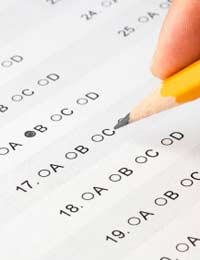What is IQ and How it is Measured?

IQ stands for ‘Intelligence Quotient’ and is a numerical score based on standardised tests which attempt to measure intelligence. Although it originally referred to the first intelligence scale, developed by French psychologist, Alfred Binet, to measure mental ability in children, it is now used in conjunction with several intelligence scales and is a considered a general indicator of intelligence.
IQ and Intelligence Scales
The term ‘intelligence quotient’ was first coined in 1912 by German psychologist, William Stern in reference to the intelligence tests developed by psychologists Alfred Binet and Theodore Simon, who wanted to identify students that needed special help with the school curriculum. The original formula for calculating IQ was:(mental age divided by chronological age) x 100
In other words, a person’s intelligence level was measured as a quotient of their estimated mental age and chronological age. A 10-year-old child that had the mental age of a 12-year-old was considered to have an above average IQ of 120 [(12/10) x 100]
In the 1930’s an intelligence test explicitly for adults was designed by American psychologist, David Wechsler, called the Wechsler Adult Intelligence Scale (WAIS). This was followed by the Wechsler Intelligence Scale for Children (WISC). These scales differed from the earlier versions by basing the scores on a standardised normal distribution rather than on an age-based quotient, because the latter only worked for children. Using the newer method, an average IQ of 100 was set as the centre value on a ‘bell curve’, with a standard deviation of 15 points and each score was “ranked” by a projection on the normal distribution.
Most modern intelligence scales are now based on the normal distribution method of scoring and in effect, makes the term “intelligence quotient” inaccurate but the term is now widely accepted and therefore retains colloquial usage.
Testing IQ
There are many ways to test IQ but most tests involve a number of problems which must be solved in a set time frame, under supervision. The areas tested include as verbal knowledge, perceptual speed, short-term memory and spatial visualization. The most common standardised IQ test used today is the WAIS which consists of fourteen subtests, seven verbal (Information, Comprehension, Arithmetic, Similarities, Vocabulary, Digit Span, and Letter-Number Sequencing) and seven performance (Digit Symbol-Coding, Picture Completion, Block Design, Matrix Reasoning, Picture Arrangement, Symbol Search, and Object Assembly).Most tests have both overall scores and individual subtest scores, showing an individual’s different performance in different areas. It is interesting to note, however, that because modern IQ tests are based on a normal distribution bell curve, they are really only designed and valid for a certain IQ range. In other words, they cannot accurately measure IQ’s at the extreme low and high ends. It should also be noted that your IQ score may not be consistent over the course of your lifetime.
Factors Affecting IQ
Like many other areas of the intelligence field, there is controversy over what affects an individual’s IQ score. For example, studies have shown that it does seem to be affected by environmental factors such as childhood nutrition, prenatal exposure to toxins and duration of breast-feeding. Other studies suggest a correlation with parental social status and parental IQ but debate still rages over how much IQ is inheritable and what the mechanisms of inheritance are.At the other extreme, there are those who believe that IQ is a redundant term as intelligence cannot really be measured as a single entity and is not genetically-determined. They believe that each individual possesses multiple intelligence, the development of which is dependent on their social background.
Nevertheless, IQ is still widely used in many contexts in modern society – for example, it is used as a predictor for academic achievement and even as predictors job performance, through the use of psychometric testing.
- Intelligence in Musical Minds
- Primitive Intelligence and Evolution
- Pets and Intelligence: Which Breed is Best?
- The Phenomenon of Genius
- Savant Syndrome and Intelligence
- IQ and The Flynn Effect
- Applications of Artificial Intelligence
- Are Intelligence and Memory Linked?
- The Study of Animal Intelligence
- The Theory of Multiple Intelligences
- What is Artificial Intelligence?
- What is Intelligence and How is it Measured?
- What is Emotional Intelligence?


Re: The Study of Animal Intelligence
Animals think and feel like us. The dog, for example, sees my mom do certain things and knows she's going to go out. He runs…
Re: Are Intelligence and Memory Linked?
I'm wondering how I should help my son to excell at developing his working memory?
Re: What is IQ and How it is Measured?
how really guess the CA Value of a person
Re: What is IQ and How it is Measured?
Please can you send me a sample of a phychological test what are the questions
Re: Are You Born Intelligent or Does It Develop Socially?
i think children are born with a certain amount of intelligence, hence the environment has a major…
Re: Why are Humans More Intelligent than Animals?
The answer is staring us in the face. In every species there is a natural progression of evolution. Slow…
Re: Are You Born Intelligent or Does It Develop Socially?
I am a very average bright funny out going human being who is 60 and really I do not understand…
Re: Genetic Engineering to Boost Intelligence
I think GMO'S are ok but they also have downsides if you genetically engineer something or someone there will be…
Re: Why are Humans More Intelligent than Animals?
It's a very nice but you should show more information about the brain of animals and human
Re: How Intelligence Influences Dating
Hello, great article, thank you! I'm actually writing my master thesis on intelligence and dating. I would really…